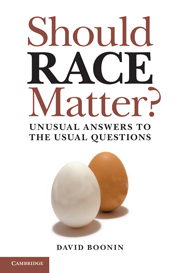Book contents
- Frontmatter
- Contents
- Preface
- 1 Thinking in Black and White
- 2 Repairing the Slave Reparations Debate
- 3 Advancing the Slave Reparations Debate
- 4 One Cheer for Affirmative Action
- 5 Two Cheers for Affirmative Action
- 6 Why I Used to Hate Hate Speech Restrictions
- 7 Why I Still Hate Hate Speech Restrictions
- 8 How to Stop Worrying and Learn to Love Hate Crime Laws
- 9 How to Keep on Loving Hate Crime Laws
- 10 Is Racial Profiling Irrational?
- 11 Is Racial Profiling Immoral?
- Notes
- Sources
- Index
5 - Two Cheers for Affirmative Action
Why There’s Nothing Wrong with Not Abandoning Racial Preferences, Either
Published online by Cambridge University Press: 05 June 2012
- Frontmatter
- Contents
- Preface
- 1 Thinking in Black and White
- 2 Repairing the Slave Reparations Debate
- 3 Advancing the Slave Reparations Debate
- 4 One Cheer for Affirmative Action
- 5 Two Cheers for Affirmative Action
- 6 Why I Used to Hate Hate Speech Restrictions
- 7 Why I Still Hate Hate Speech Restrictions
- 8 How to Stop Worrying and Learn to Love Hate Crime Laws
- 9 How to Keep on Loving Hate Crime Laws
- 10 Is Racial Profiling Irrational?
- 11 Is Racial Profiling Immoral?
- Notes
- Sources
- Index
Summary
I argued in Chapter 4 that race-based affirmative action isn’t morally obligatory. Many people will agree with me about this. But most of those who do agree will insist that I haven’t yet gone far enough. Not only is affirmative action not obligatory, they’ll say, it’s not even permissible. It’s not just that it’s not immoral not to practice affirmative action on their view. It’s that it’s positively immoral to practice it. But I think these people are mistaken, too. Having explained in the previous chapter why I’m not convinced by arguments for the claim that affirmative action is obligatory, then, I’ll try in this chapter to explain why I’m not convinced by arguments for the claim that it’s unjust or impermissible either.
Before turning to the many arguments that have been offered against affirmative action, though, two preliminary points should be made. These points parallel the two preliminary points I made before discussing the arguments in favor of affirmative action in the previous chapter. First, in maintaining that affirmative action is not morally impermissible, I don’t mean to be insisting that no institution has or could have a moral obligation to refrain from practicing affirmative action. If a school or business makes an explicit promise not to practice affirmative action in its admissions or hiring decisions, for example, then that might well make it impermissible for the school or business in question to practice affirmative action. If the management of a publicly traded corporation does not reasonably believe that practicing affirmative action will be in the corporation’s financial interests, and if it fails to notify its shareholders that it plans to practice affirmative action despite the fact that doing so will not be in the corporation’s financial interests, then its fiduciary obligations to the corporation’s shareholders might well make it impermissible for that particular corporation to practice affirmative action. Such considerations, though, wouldn’t do anything to show that affirmative action itself is morally impermissible unless there was a reason to think that it was morally obligatory to promise not to practice it, in the first sort of case, or to fail to notify the shareholders that it would be practiced, in the second. At most, they would simply establish that some policies that are not otherwise impermissible can become impermissible when promises of a certain sort are made or information of a certain sort is concealed. Since my concern in this chapter is with the question of whether there’s something about affirmative action itself that makes it wrong to engage in it, I will simply set these sorts of considerations to the side. As long as it’s morally permissible not to make the sorts of promises or commitments that might in turn require an organization not to practice affirmative action in order to live up to the expectations it has reasonably generated in other people, these sorts of considerations will be irrelevant to trying to determine the moral status of affirmative action itself.
- Type
- Chapter
- Information
- Should Race Matter?Unusual Answers to the Usual Questions, pp. 175 - 202Publisher: Cambridge University PressPrint publication year: 2011



